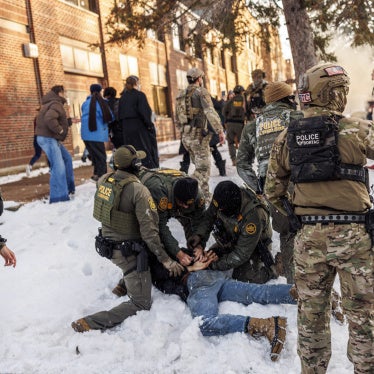The U.S. State Department has exaggerated Uzbekistan's human rights gains, evidently in order to maintain foreign assistance to that country's government, Human Rights Watch said today.
In an August 26 document that has not been released to the public, Secretary of State Colin Powell reported to the U.S. Congress that Uzbekistan is making "substantial and continuing progress" in meeting the human rights and democracy commitments contained in a Joint Declaration signed with U.S. officials in March 2002. The State Department's determination was required for $45 million in additional assistance to the Uzbek government to be released, under legislation enacted by the Congress in July.
"The State Department did not use this law as it was intended," said Tom Malinowski, Washington advocacy director for Human Rights Watch. "We expected a proactive effort. All we got was a pro-forma report."
The United States has publicly expressed concern about recent setbacks in Uzbekistan, which include deaths in custody of religious prisoners and the forced psychiatric detention of a human rights defender. Yet on the basis of conversations with U.S. officials, Human Rights Watch believes that the State Department made no attempt to use the new law to leverage additional progress on those concerns before it made its positive determination.
In March 2002, a U.S.-Uzbek Joint Declaration committed Uzbekistan to ensure a "strong and open civil society," "respect for human rights and freedoms," a "genuine multi-party system," "free and fair elections," "political pluralism, diversity of opinions and the freedom to express them," "the independence of the media" and "independence of the courts."
In determining progress in these areas, the State Department listed a number of steps taken by Uzbekistan in response to U.S. concerns. Yet for each step cited, Uzbek authorities have adopted repressive measures that undermine its impact. For example:
The State Department cited the registration of the Independent Human Rights Organization of Uzbekistan, the first such group permitted to function legally in the country, and expressed hope that other groups would be legalized soon. Yet since March, no other groups have been registered and at least four human rights defenders have been arbitrarily detained. Another defender, Yuldash Rasulov, is on trial on charges relating to "religious extremism." On August 28, the authorities forcibly committed yet another human rights defender, Elena Urlaeva, to a mental institution, where for the past few days she has been denied visits even from her family.
The State Department cited prison sentences handed down against seven police and security agents since January for two deaths in custody, as well as an invitation to the U.N. Special Rapporteur on Torture to visit Uzbekistan. But since March, Human Rights Watch has documented three new deaths arising from suspicious circumstances in custody. Two deaths, those of Muzafar Avazov and Husnidin Alimov, took place in August just prior to the State Department's positive determination. Many other deaths in custody and countless reports of torture remain uninvestigated. In May the Uzbek government failed to provide the U.N. Committee against Torture with requested statistics on the number of detainees in its facilities.
The State Department cited declining arrests of Muslims whose religious practices and affiliations fall beyond state controls. Yet the pace of arrests and trials since March indicates that the Uzbek government has not relented in its campaign to arrest and persecute such people. Between February and July, Human Rights Watch's research alone found that 116 people were convicted on charges relating to religious "extremism," and that dozens more were arrested. The State Department acknowledges there are still about 6,500 prisoners in Uzbekistan convicted on "extremism" charges, most of whom were arrested and charged for their protected religious beliefs, practices, and affiliations.
The State Department cited the opposition political party Birlik's ability to hold five regional congresses since April, without government interference. But past and current members of Birlik remain on police lists and are required to report regularly to police and to sign statements explaining their current activities. Members of other banned political parties continue to be harassed and risk arbitrary detention for gathering informally or discussing political issues. Also, since March, citizens who have tried to organize protests on economic, social, and political issues have been harassed, threatened, and detained.
The State Department cited the abolition of formal prepublication censorship. But authorities apparently have transferred the role of censor from the press censor's office to newspaper editors. After running several articles that would not have been published previously, the editor of at least one newspaper was subsequently summoned by the presidential administration and pressured to stop publishing such material. Overall media content has otherwise not changed. Journalists continue to risk arbitrary detention. Last week, Uzbek police arrested human rights defender Jakhangir Shosalimov, of the Independent Human Rights Organization of Uzbekistan, on doubtful charges of inciting a riot, when in fact he had helped a journalist arrange an interview with a victim of police violence.
The State Department gave credit for progress that has yet to be seen. For example, it cites judicial reforms announced last August, before the Declaration was adopted, but which remain unimplemented.
Conditions on U.S. assistance to Uzbekistan, which totaled $173 million this year, are likely to be maintained by the U.S. Congress, and Human Rights Watch urged the Bush administration to use them more effectively to obtain progress.
"We recognize that in many ways American engagement on human rights in Uzbekistan has intensified since September 11, rather than ending as many feared," Malinowski said. "But that engagement won't be effective unless the Bush administration sends the message Congress intended: that continued U.S. support for the Uzbek government depends on greater responsiveness to U.S. concerns on human rights."







